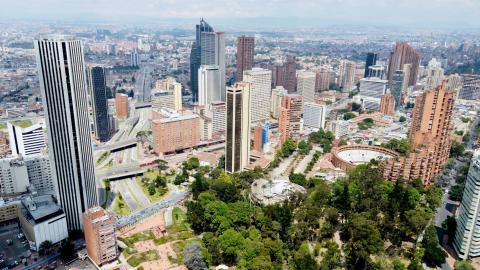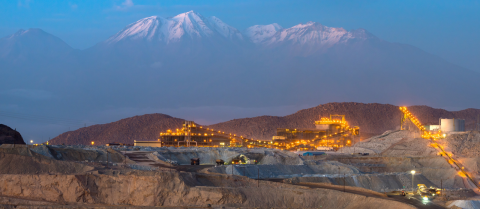
Données narratives de l'ITIE - atelier
EITI, Omidyar Network, UNEP, World Bank and IMF, invite EITI stakeholders to a data storytelling bootcamp. The goal of the bootcamp is - in line with the Conference theme of transitioning “From Reports to Results” - to share experiences and to work together to put the growing amount of EITI data to use. The longer-term objectives are to demonstrate that disclosing EITI Reports as Open Data leads to a range of benefits for all stakeholders, and to develop a community of data storytellers and Open Data experts in the EITI countries.
Participants of the Data Storytelling Bootcamp will get an introduction to of a range of EITI data projects during the morning, get to know them better and then finally select one workstream. After lunch, the participants of each workstream will sit together and develop a story, a concept, a visual or another kind of product that will be demonstrated in the final session.
09:00 Registration
10:00 Morning session
Opening by Jonas Moberg, EITI
Introductions to the workstreams
Chose your workstream
12:15 Lunch
13:15 Data bootcamp session opens
Workstream 1: Analyzing government statistics data
Workstream 2: Financial modelling
Workstream 3: Mapping EITI data disaggregated by concessions
Workstream 4: Open Contracts
Workstream 5: Agile development to user-centered design
Additional workstreams to be added closer to the event.
15:45 Break
16:15 Demos, Q&A and reflections
Demos from the workstreams and final reflections by
- Andrew Clarke, Omidyar Network
- Alberto Jimenez de Lucio, IMF
- Martin Lokanc, the World Bank
- Alessandra Ordenes, PHEITI
- Sam Bartlett, EITI (moderator)
17:45 Panel debate and discussion: EITI Data to Development - The Importance of Public Interest Financial Modeling
Organised by CCSI, IBIS, IMF and OpenOil. Introductions by
- Perrine Toledano, CCSI
- Benjamin Boakye, ACEP
- Peter Mullins, Fiscal Affairs Department, IMF
- Johnny West, OpenOil
- Morten Blomqvist, IBIS (facilitator)
19:15 Ends
Presentation of the workstreams
Additional workstreams and information about the ones below will be added closer to the event. If you are interested in facilitating a workstream, please contact [email protected].
Workstream 1: Analyzing government statistics data
Facilitator: Alberto Jiminez de Lucio, IMF
This workstream will also be provided in Spanish.
Workstream 2: Learn how to do financial modeling in the public space
In a very real sense, financial models are what data in EITI reports are for. How much should a project earn? How does that translate into profit shares for both sides? What happens if the market, or fiscal regimes, change? Models may seem like dry number crunching. In fact, they tell stories. They provide the shapes of the huge projects. So come and get hands on experience in how to do it!
What you need: Laptops. No previous experience needed, but familiarity with Excel, and comfort with numbers will help.
What will happen: You will do a basic exercise on a training model, and understand the elements that go into financial models.
Facilitator: Johnny West, OpenOil + Peter Mullins, IMF
Workstream 3: Mapping EITI data disaggregated by concessions Mapping and Assessing the Performance of the Extractives Sector (MAP-X)
A new partnership by UNEP and the World Bank called MAP-X seeks to catalyze the next major transparency revolution in the extractive sector. MAP-X will consolidate all existing extractive sector information into a single open data platform that is visually intuitive and easy to use by local authorities and communities, national ministries, and extractive companies. It will allow these stakeholders to conduct improved risk and impact analysis of the sector as well as provide a series of tools to enable site-specific monitoring of compliance and performance.
The MAP-X prototype is currently being piloted in Afghanistan and DR Congo. If successful, the pilot work done in both countries will offer an open data, analysis and monitoring tool to all EITI compliant countries.
Facilitator: David Jensen, UNEP
Workstream 4: Open Contracts
Facilitated by PHEITI
Workstream 5: Application of User-centered Design Process to Create a Web-based Report
The design of the USEITI web-based report followed a user-centered design process in which the needs of the people using the website are put in the center of the design process. It is an ongoing multi-stage, iterative process.
In this compressed design workshop participants will identify user personas; craft problem statements, metrics to test them, and participate in usability testing of a website mock-up.
Facilitator: Judith Wilson, USEITI
Workstream 6: DataViz and the Extractives
As more and more extractives data enter public domain, data visualisations gain importance as a way to communicate information to a wider public.
This workstream will focus on the many tools and techniques available to anyone who wants to express data in the form of charts, infographics and maps. Starting with best practices and key concepts, participants will then get the chance to get hands-on visualisation experience. So bring your laptops!
Facilitator: Anton Ruehling, OpenOil
Panel debate and discussion
From Data to Development: The importance of public interest financial Modeling
Tuesday 23 February 17:45
Lima Convention Center (room tbc)
Organised by CCSI, IBIS, IMF and OpenOil.
Using financial modeling in the EITI context.
Who should come: EITI National co-ordinators and secretariats; government and civil society representatives with an interest in understanding the importance of fiscal modeling and benchmarking to make sense of the EITI data
Goal: To describe the user cases of public interest financial modeling using project-level data provided by EITI: from government to civil society, how can fiscal modeling and benchmarking be used to developer stronger fiscal terms?
Background: Financial modeling of oil and mining projects is an activity which requires relatively high technical capacity. Yet several organisations have proved that it is possible in the context of governance in EITI member states in Latin America, Africa and Asia. Modeling could provide a powerful complement to EITI processes and several Multi Stakeholder Group have already expressed an interest. If EITI reconciliations currently verify reports of payments by governments and companies, modeling, in theory, could reconcile actual historical payments against what contracts, and other inputs like production and price data suggest should have been paid. They thus bear directly on the question of: what explains the discrepancy between contractual terms and actual payments? As well as other questions of high interest to EITI constituencies, such as: can any estimate of future payments and their sensitivities to price and other factors come into public debate? How can fiscal models be used to benchmark contracts across comparable countries and understand the room of maneuver to increase government take while keeping a satisfying rate of return for the investor?
Participants and Format: Perrine Toledano, CCSI; Benjamin Boakye, ACEP,; Peter Mullins, Fiscal Affairs Department, IMF; Johnny West, OpenOil and Morten Blomqvist, IBIS as a facilitator. Each of the participants will deliver a 10-15 minute presentation of modeling projects undertaken and the lessons learned; then the session will be opened to the floor.
- What do fiscal models say and what they don’t (CCSI)?
- How can fiscal benchmarking models inform the public debate about taxation of mines (ACEP)?
- What is, or should be, different about financial modeling done for the public domain? (Open Oil)?
- What is the IMF’s experience with the FARI model, and its expectations in the releasing of a public version of the model (IMF)?
The EITI Open Data Policy
Approved by the International EITI Board on 9 December 2015.
Preamble
1. This policy contains recommendations on open data in implementation of the EITI. It builds on lessons emerging from national level implementation and emerging international best practice.
2. The EITI Principles declare that “a public understanding of government revenues and expenditure over time [can] help public debate and inform choice of appropriate and realistic options for sustainable development” (EITI Principle 4). The EITI Standard therefore requires EITI Reports that are “comprehensible, actively promoted, publicly accessible, and contribute to public debate” (EITI Requirement 6). Improving the accessibility and comparability of EITI data is essential to realise these objectives.
Open Data Objectives
3. Open EITI data can increase transparency about what government and business activities, and increases awareness about how countries’ natural resources are used and how extractives revenues are levied and spent, providing strong incentives for that money to be used most effectively.
4. Open data promotes accountability and good governance, enhances public debate, and helps to combat corruption. Providing access to government data can empower individuals, the media, civil society, and business to make better informed choices about the services they receive and the standards they should expect. Open data, can also be a valuable tool for government in improving policy making and sector management.
5. Free access to, and subsequent re-use of, open data are of significant value to society and the economy.
Open Data in EITI Implementation
6. EITI Implementing countries are encouraged to:
a) orient government systems towards open data by default. It is recognised that there is national and international legislation, in particular pertaining to intellectual property, personally-identifiable and sensitive information, which must be observed.
b) ensure that this data are fully described, so that users have sufficient information to understand their strengths, weaknesses, analytical limitations, and security requirements, as well as how to process the data.
c) release data as early as possible, allow users to provide feedback, and then continue to make revisions to ensure the highest standards of open data quality
d) release data under an open license that allows users to freely obtain and easily re-use it
e) share technical expertise and experience with other countries to maximise the potential of open data
f) work to increase open data literacy and encourage people, such as developers of applications and civil society organisations that work in the field of open data promotion, to unlock the value of open data;
g) ensure that data is interoperable with national and international standards, including adopting data standards approved by the EITI board and additional guidance provided by the EITI secretariat;
h) where possible use unique identifiers to link data across years of reporting or different sources;
i) work towards mainstreaming the creation of open data for EITI into government systems to ensure timeliness, data quality, reuse and cost effectiveness;
g) provide data in granular, machine-readable formats.
Contenu connexe

SOE governance and responsible commodity trading in Latin America and the Caribbean




